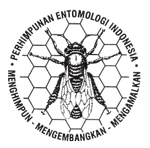Peran insektisida botani ekstrak biji mimba untuk konservasi musuh alami dalam pengelolaan serangga hama kapas.
DOI:
https://doi.org/10.5994/jei.6.1.42Keywords:
neem seed extract, Gossypium hirsutum, conservation.Abstract
Natural Enemies Conservation: The Role of Neem-seed Extracts for Natural Enemies Conservation Used of Cotton Insect Pest Control. Insects associated with cotton plant are numerous, as the plant bears extrafloral nectar. More than 90 species of natural enemies are reported and identified. They could manage the cotton pest, keeping the pest population is under action threshold level when their presence is considered in scouting and action threshold concept. However, most of cotton farmers are insecticide-spray-minded people who think that insecticide sprays is a must in cotton cultivation. This behavior is unfavorable for the natural enemies in building their population so they can act as an effective mortality factor for the pest. Neem seed extract (NSE) is toxic to herbivores but relatively safe for natural enemies, so that it could be used as a substitute for synthetic chemical insecticides. Therefore, NSE is recommended to be used for conserving natural enemies in cotton agro ecosystem.Downloads
Download data is not yet available.
Downloads
Published
2016-12-15
How to Cite
Sunarto, D. A., & nurindah, nurindah. (2016). Peran insektisida botani ekstrak biji mimba untuk konservasi musuh alami dalam pengelolaan serangga hama kapas. Jurnal Entomologi Indonesia, 6(1), 42. https://doi.org/10.5994/jei.6.1.42
Issue
Section
Articles
License
Authors who publish with this journal agree to the following terms:
- Authors retain copyright and grant the journal right of first publication with the work simultaneously licensed under a Creative Commons Attribution 4.0 International License that allows others to share the work with an acknowledgement of the work's authorship and initial publication in this journal.
- Authors are able to enter into separate, additional contractual arrangements for the non-exclusive distribution of the journal's published version of the work (e.g., post it to an institutional repository or publish it in a book), with an acknowledgement of its initial publication in this journal.
- Authors are permitted and encouraged to post their work online (e.g., in institutional repositories or on their website) prior to and during the submission process, as it can lead to productive exchanges, as well as earlier and greater citation of published work (See The Effect of Open Access).








